- Home
- James A. Michener
Sayonara: A Novel Page 3
Sayonara: A Novel Read online
Page 3
“I simply can’t believe it! Yellow girls as mothers of an American home! Even the poor fellows who married French girls last time … Remember those awful Farringdons at Camp Polk?”
General Webster asked, “Any of your outfit married to Japanese girls?”
I said, “I spent all afternoon last Friday arguing with a kid nineteen who’s determined to marry one of them.”
“How deplorable!” Mrs. Webster sighed. She spoke with real compassion, and it was apparent that she honestly felt sorry for any nineteen-year-old boy who, far from home, had got himself mixed up with a Japanese girl.
At that moment a fat Army major, obviously a civilian, came ambling down the street, window-shopping as he might have done in San Francisco, and on his arm, window-shopping too, was a Japanese girl. Some fellow officers wandered by and the fat major stopped them to introduce his girl just as if she had been a girl he was dating at home. The girl chatted with the other officers for a moment and then led her major on down the street.
“You must do something about such behavior,” Mrs. Webster said grimly. “At least on the officer level.”
Our Cadillac stopped at Camp Kobe and General Webster bounded out of the car and said, “I have one disagreeable job to do. Nancy, you go on back to the club. Lloyd and I’ll meet you there soon.”
Mrs. Webster smiled at me archly and said, “They’re having a special luncheon for us today. I might almost say an extraordinary one.”
The general showed me to a davenport in his outer office—paneled in Japanese pine and very handsome—and told his aide, “All right, I’ll see him now.” A colonel with highly polished boots disappeared into an inner room and said crisply, “General Webster will see you now.”
Through the door came sawed-off Airman Kelly. Playing the Air Force game, he never acknowledged he knew me but stared straight ahead, following the spruced-up colonel, but as he disappeared through the door leading to General Webster’s inner office, he shrugged his shoulders.
I studied the maps in the general’s waiting room and browsed through his copy of the Infantry Journal, but my reading was disrupted by the general shouting, “Why in hell do you want to marry her, anyway?”
Then I heard the colonel argue more persuasively, “But, Private Kelly, if you do marry her you can’t take her back to the States.”
Kelly’s response was muffled but judging from what happened next the kid must have said, “I don’t want to go back to the States,” because the general shouted, “By God, I’ll send you back whether you want to go or not. Colonel, send this young whippersnapper home. Tonight!”
That was when I first heard Kelly’s voice. He said, “I won’t go.”
The general exploded. “You won’t go!”
Kelly said, “That’s right, because Congressman Shimmark has arranged it for me to get married.”
I have found that no matter where you are in the military—Army, Air Force, Navy, it doesn’t matter—things quiet down when somebody mentions Congress. I remember hearing about the time my father was stuck in the Philippines without supplies. It was during the battle when he got his fourth star and MacArthur could drop dead and Nimitz was a bum and he would bust Roosevelt in the nose. But a five-foot-four-inch Congressman appeared and Father became as smooth as butter. Because he knew that Congressmen run the military. They approve the budget.
So General Webster retreated before the name of Congressman Shimmark. “All right,” he blustered, “go ahead and ruin your life. I’ve done my duty. I’ve tried to stop you.” Then he apparently turned to the colonel, for he snapped, “Arrange the young fool’s wedding. Next we’ll be running a nursery.”
The colonel was grim-lipped as he led Kelly back into the waiting room. “Who do you think you are,” he muttered savagely, “speaking to a general that way?”
Kelly said with great finality, “I ain’t takin’ no more pushin’ around. I’m gettin’ married.”
The colonel showed him to the door and said, “You’ll regret it as long as you live.”
Kelly looked at the colonel and laughed. Then he saw me and shrugged his shoulders again. “Saturday,” he said through the corner of his mouth.
When he had gone the general appeared. He was red in the face and mumbling. “By God, in the old days we’d have thrown an insolent moron like that into the stockade. Now it’s the new Army, and every young pup writes to his Congressman. Damn, I wish all Congressmen would drop dead.” Quickly he looked about the room to see if anyone had heard this remark.
The colonel tried to make a joke and said, “You can’t stop men from marrying women!”
The general looked at him as if he had gone off his rocker and growled, “But you can keep officers of the United States Army from making utter fools of themselves in public. And by God I will.”
Then he saw me and, taking me by the arm, said, “Lloyd, I certainly do wish the imbeciles I have under me were sensible like you. But then you’ve been reared in a tradition of service to the nation. You understand what a uniform means.” He looked for his Cadillac, which hadn’t yet returned, and called for a Buick instead. As soon as we got inside he said, “Speaking of Eileen, let’s eat.”
“I wasn’t speaking of Eileen.” I laughed.
“I was,” he said “Because … I mean … it’s inconceivable that these officers you see parading Japanese girls could ever have known clean, decent American girls like Eileen.…”
He turned abruptly and his voice sputtered like a volcano gasping for air. Across the street stood the fat major and his window-shopping Japanese girl. They were looking at dresses, holding hands in the spring sunshine. The general leaned forward and asked his driver, “Isn’t that Major Bartlett?”
“Yes, sir.”
“A shoe salesman in civilian life,” the general snorted. “What can you expect?”
The driver corrected him. “Major Bartlett’s the one who owns the chain of filling stations, sir.”
General Webster relaxed. “God, what an army!” he sighed.
We drove up to the de-luxe Japanese hotel which housed the officers club and I could sense the general becoming excited at the prospect of surprising me with Eileen. As a matter of fact, I got pretty steamed up myself because I hadn’t seen Eileen for more than a year. Nervously I slapped my wallet for good luck and started up the marble steps.
A Japanese bellhop greeted the general. A Japanese bell captain handed him some papers. A Japanese elevator operator took us briskly up to the general’s suite and a Japanese chambermaid hurried down the hall ahead of us. A Japanese butler opened the door for us, grinning happily, and a Japanese housemaid bowed almost to the floor, honoring the general.
I stood at attention, waiting for the tall library doors to open, and I remember saying to myself, “Now look, squarehead, you’ve got to act surprised.” But I didn’t need the coaching, for Eileen appeared unexpectedly from the hallway and she was twice as lovely as I had remembered. “Wow!” I cried, hurrying to her, and I noticed that she was more what you might call curved, more lovely when she smiled.
She hurried to meet me and we kissed and I said, “Wow! what a wonderful way to bring a man back from Korea!” and she said, “I wanted to cable you the minute the Army said I could come, but Mother said, ‘We’ll surprise him.’ ”
Mrs. Webster interrupted, “We didn’t want to take your mind off your flying,” she said.
Eileen asked, “Was it pretty rough this time?”
“They’ve got the first team playing.”
I held her two hands tightly and stepped back to study her. “Hair fixed differently, eh? Oh, that beautiful blonde hair when everyone out here has black. And your dress … It seems to go in and out a lot—nice.”
“It’s meant to go in and out.” Eileen laughed. “I go in and out.”
General Webster coughed and I said, “You’re much prettier than any photograph you sent me—except maybe that special one in the bathing suit. Boy, did that one go in and o
ut!”
Eileen said, “That one was all out. I weighed eight pounds more that summer!”
General Webster said, “Do you suppose we could go down and eat?”
But Mrs. Webster was enjoying the romantic scene she had arranged and said, “First we’ll drink to the young lovers.” She produced a set of shimmering wine glasses and explained, “From the P.X. The little Japanese sales-clerk said they were made right here in Kobe.”
General Webster poured the sherry and declaimed dramatically, “To the lovers!” Then he looked at his wife and complained, “What an ugly phrase! Aren’t lovers French people who live in an attic and never get married?”
“No!” Eileen cried. “Lovers are people in an English movie who live in a grass cottage and the vicar’s wife condemns them.”
“Very unpleasant word, anyway.” He poured fresh sherry and said, “To Major Lloyd Gruver and Eileen Webster, United States Air Force. That sounds a damned sight more American and a damned sight more healthy.”
Mrs. Webster laughed. “You’re right, Mark, but lovers has another perfectly good meaning too. Average American people whatever their ages who love each other—even when they’ve been married twenty-six years.” She went over and kissed the general warmly.
My own father and mother had never gotten along together too well and from about ten on I realized that no matter what great advancements my father received and no matter how ordinary Mark Webster’s career turned out, my parents envied the Websters because Mark and Nancy were in love while my father and mother were not. Sometimes Father would betray his contempt for Mark Webster’s willingness to be pushed around by his wife, and my mother, who came from a famous German family in Lancaster, Pennsylvania, usually stayed there with her circle of friends and spoke sadly of Nancy Webster, “chasing about the world like a camp follower.”
At this moment in Kobe, when the senior Websters were kissing, I shared my parents’ feelings and for the first time I realized with a certain degree of shock that when I married their daughter Eileen I would more likely resemble my father than become a second Mark Webster. There would always be some restraint upon me; yet standing there before Eileen and seeing her so radiantly lovely I concluded that I was deeply in love—in my way and my father’s way, and I thought in that hesitating moment that my partial love, as you might term it, could lead to the creation of a solid family like Father’s, to my promotion in the Air Force like his promotion in the Army, and to a substantial position in society like the one my mother enjoyed in Lancaster. I said to myself, “This is a soldier’s way of loving.”
But I think Mrs. Webster, who knew my parents well, must have sensed my thoughts, for she cried, over her husband’s shoulder, “Kiss the girl, Lloyd.”
I did and the general begged, “Now can we eat?”
We went down to the dining room, where the Japanese headwaiter had arranged a pretty dazzling table with flowers and a church carved out of ice. Three Japanese waiters held our chairs and a three-piece Japanese orchestra hammered out a jive version of “Here Comes the Bride.” The officers at nearby tables rose and applauded, but the luncheon was spoiled because right next to our table sat the Marine lieutenant with his beautiful Japanese girl, while next to the orchestra were the fat major and his window-shopping girl.
Mrs. Webster fidgeted with her napkin and said, “If I knew it wouldn’t humiliate you I’d leave. Who won the war, anyway?”
Eileen grasped her mother’s arm and whispered, “They’re fine girls. Please don’t create a scene.” Mrs. Webster subsided and started to splash her spoon in her cup but soon stopped.
“I simply have no appetite,” she said firmly.
The luncheon was a calamity and as soon as he could decently do so General Webster dragged me back to bis office where he shouted at his aide, “Go out and haul in Major Bartlett.” Then he called his secretary and dictated a sharp note: “Effective immediately no Japanese nationals shall participate in any functions of the Kobe Officers Club, including specifically but not exclusively eating in the Club dining room.”
“Post it conspicuously!” he said, and as the secretary started to leave the general boomed out, “Be especially sure there’s one in every elevator.”
When Major Bartlett appeared the general really ate him out. The fat major, one of those particularly exasperating civilians who won’t take military life seriously, didn’t even bother to snap to attention.
“Your behavior is a disgrace.”
“I understand.”
“You can’t understand, or you wouldn’t go lollygagging down a public street holding hands with a Japanese girl.”
“I understand.”
“Damn it all, these people were our enemies a short time ago.”
“Not mine. I fought in Germany.”
“Well, your country’s. You ought to respect your nation’s responsibilities.”
“I understand,” the major droned in an unusually offensive way.
“You understand that you’re not to bring that girl into the Club again?”
“I understand.”
This infuriated the general, who said sharply, “And you’re not to be seen on the public streets with her.”
The major looked at me, raised his eyebrows and said, “I understand.”
This was too much for the general. He said sharply, “Major Bartlett, I’ve been ordered to send a levy to Korea. You’d better go along.”
“Certainly.”
Now I’d had enough. I cried, “Certainly, sir. You know there’s such a charge as insolence through manner.”
“Certainly, sir,” the fat man said to me, nodding slightly.
“Stay out of this, Gruver,” the general commanded. “Bartlett, the levy moves out tomorrow.”
“Certainly, sir!” he said with the greatest military precision, throwing us each an extra-snappy salute.
When he had left the general said, “The perpetual civilian. Well, there’s no use court-martialing a man like that. Maybe Korea’ll knock some sense into him.”
“I wish you’d let me handle him,” I said.
“You’ll learn that the Army gains more in the long run by taking civilian nonsense. But, by God, you don’t have to take it at meals.”
That evening when we returned to the Club and entered the elevator, the general noted with satisfaction that his memorandum had been posted, but when he read to the bottom of the typed sheet he turned a bright purple, for someone had scrawled in pencil, “Signed, Mrs. Mark Webster.”
“Who did that?” the general shouted.
The Japanese girl who ran the elevator could not read English and had no idea of what the general was enraged about. He pointed at the penciled signature and demanded, “Who do this?”
“Me no see,” she whispered, cowering in the corner.
In her confusion the elevator stormed past the general’s floor and by the time the frightened little girl could get it back under control, General Webster had ripped down the announcement. Then he dragged the girl into his suite and rang furiously for the hotel manager, who established the fact that Major Bartlett had ridden in the elevator that afternoon. But it was impossible to prove anything and by mealtime everyy officer in the hotel knew about the incident, for civilian officers are like schoolboys—always giggling with delight when something embarrasses the headmaster.
Dinner that evening was a chilly affair. Eileen and I sat in silence and absorbed the hateful stares of the officers who normally brought Japanese girls in to dinner. Major Bartlett appeared, bowed my way and sat right where the general would have to see him, chatting happily with some cronies and telling dirty stories. But the principal target of the icy stares that night was Mrs. Webster, who didn’t seem to mind at all. She had been through many Army crises with her husband—some, like this, which she had precipitated—and she had never wilted under criticism. My father did not approve of her meddling in Army life but once said, “If you ever get into trouble, Lloyd, be like Nancy Web
ster. Stick your chin out and take it.”
Now she brazenly pointed at a table where three American schoolteachers were dining with some civilian men employed by the Army to run the gasoline-supply system. In a voice just loud enough to be heard by eavesdroppers she said, “Isn’t it charming to see those pretty American girls at that table?”
Somebody had to say something, so I offered, “After you’ve been in Korea, it’s wonderful to see an American girl.”
I realized immediately that this sounded pretty awful, and I was sure of it when Major Bartlett suddenly picked up his spoon and started polishing it like mad. I glared at him but he simply looked at the spoon, breathed on it the way you do when you’re polishing apples and polished some more.
Any trouble between me and the fat major was averted by the appearance of the young Marine lieutenant and his lovely Japanese girl. He had apparently not seen the notice, for he headed toward a vacant table and everyone in the room looked up to see what would happen.
The headwaiter pounced on the couple, explained the situation to the girl in rifle-hot Japanese and the obviously well-bred girl turned away in an agony of embarrassment. The Marine wouldn’t take this. Calmly he grabbed his beautiful girl by the hand and led her against her will to the table. The headwaiter was furious. He hissed instructions at the girl and he had the bad luck to use some words which the Marine understood, for the American let go the chair he was holding for the girl, hauled his fist back and launched a haymaker.
Another Marine anticipated this and deftly caught his friend’s hand. Then he explained the new rule and joshed the troublemaker into leaving, but the first Marine now realized that General Webster and his party were in the room. He was aghast. Quickly he shooed the slim Japanese girl out the door and came over to our table and said briskly, “I’m extremely sorry, sir. I thought they were kidding me.”
“It’s all right,” the general laughed.
“I’m extremely sorry, Mrs. Webster.”
She was most gracious and the general felt good. He said, “Lieutenant Bailey, may I introduce Major Gruver. He joins your board next week.”

 Mexico
Mexico The World Is My Home: A Memoir
The World Is My Home: A Memoir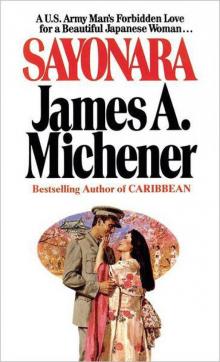 Sayonara
Sayonara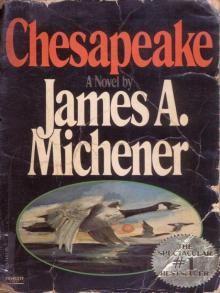 Chesapeake
Chesapeake The Novel
The Novel Rascals in Paradise
Rascals in Paradise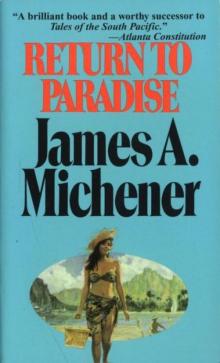 Return to Paradise
Return to Paradise Presidential Lottery: The Reckless Gamble in Our Electoral System
Presidential Lottery: The Reckless Gamble in Our Electoral System The Source
The Source Poland
Poland Space
Space Caravans
Caravans Creatures of the Kingdom: Stories of Animals and Nature
Creatures of the Kingdom: Stories of Animals and Nature Iberia
Iberia Hawaii
Hawaii The Watermen: Selections From Chesapeake
The Watermen: Selections From Chesapeake Report of the County Chairman
Report of the County Chairman The Covenant
The Covenant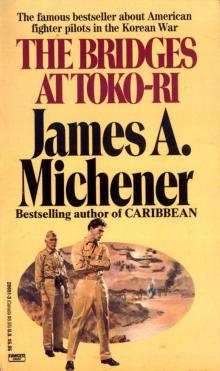 The Bridges at Toko-ri
The Bridges at Toko-ri Matecumbe
Matecumbe Journey: A Novel
Journey: A Novel Centennial
Centennial Sports in America
Sports in America Texas
Texas Miracle in Seville
Miracle in Seville This Noble Land: My Vision for America
This Noble Land: My Vision for America Tales of the South Pacific
Tales of the South Pacific Bridges at Toko-Ri
Bridges at Toko-Ri Space: A Novel
Space: A Novel Presidential Lottery
Presidential Lottery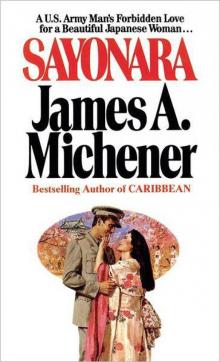 Sayonara: A Novel
Sayonara: A Novel This Noble Land
This Noble Land The Covenant: A Novel
The Covenant: A Novel Miracle in Seville: A Novel
Miracle in Seville: A Novel The Bridge at Andau
The Bridge at Andau Source
Source The Source: A Novel
The Source: A Novel Journey
Journey Recessional: A Novel
Recessional: A Novel Legacy: A Novel
Legacy: A Novel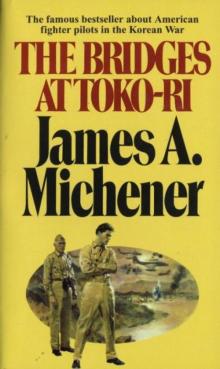 The Bridges at Toko-Ri: A Novel
The Bridges at Toko-Ri: A Novel Poland: A Novel
Poland: A Novel